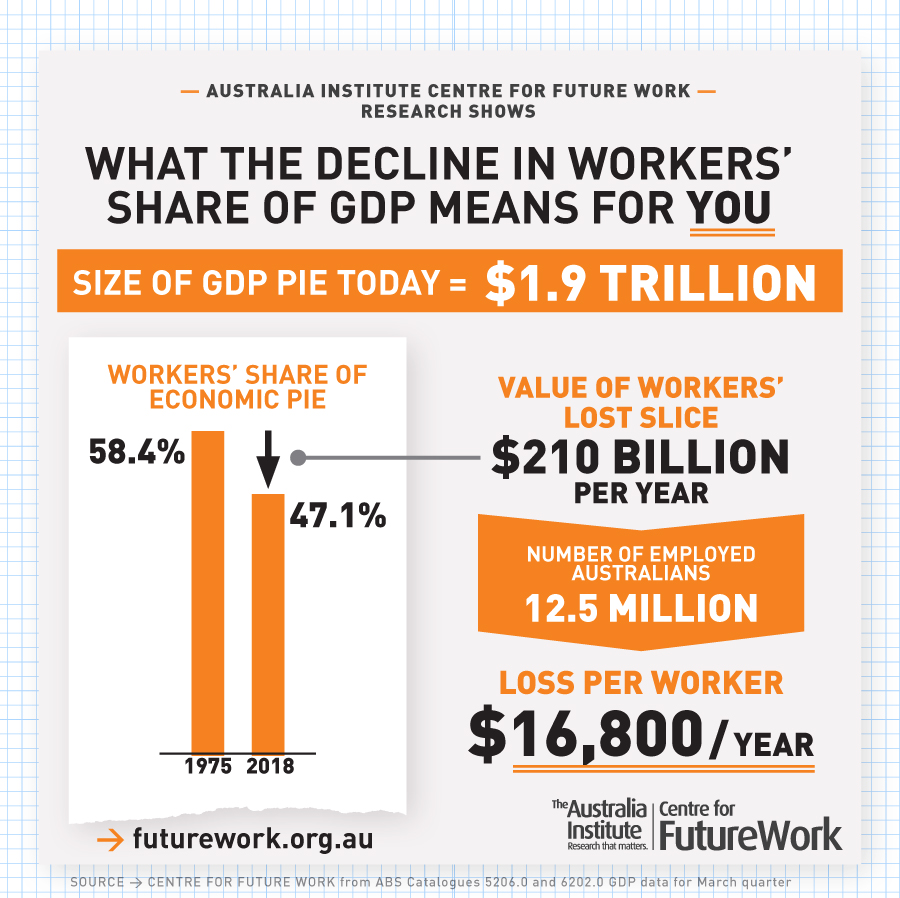Stagnant Wages - Big Business taking Billions
Written by: John G. on 5 May 2022
In the election commentary, there’s a lot of discussion about how wages have been stagnant, locked down, held way below inflation for the last decade. They are actually losing value to inflation.
Where has that lost value been going?
Workers are still beavering away, producing goods, selling them, loading them on and off trucks, organising all the accounts, ordering supplies and the rest that goes into the production and exchange of goods. Other wage earners have kept services being delivered, teaching kids, nursing and caring for people, waiting tables, cleaning floors and the rest.
While wages have been held back. their value eroded by price hikes, the money has been cycling along with business raking in the billions.
A fair idea of what’s been happening can be gleaned from the results of some academic studies aired at a 2018 Seminar at Sydney Uni. The Centre for Future Work held the seminar to look into what had been happening long-term to the portion of the national output, the Gross Domestic Product, GDP, going to wage and salary earners.
Dr Jim Stanford, director of the Centre for Future Work, worked through Australian Bureau of Statistics data looking for answers.
He found wage and salary earners portion of GDP had gone down from its 1975 level of 58.4 per cent to 47.1 per cent of GDP in 2018.
That’s a huge amount, 11.3% of all the output of the Australian economy, that workers have lost since 1975.
Jim Stanford went further into the figures. He found wage and salary earners were losing $210 billion a year in 2018, worth $16,800 extra a year to each worker.
The trend of decline has persisted through a number of economic cycles over the last half century. It’s graphically portrayed on the accompanying poster on their website.
Another academic at the seminar, Professor of Employment Relations at Griffith University, David Peetz, had worked out that the portion of the GDP going to enterprise profits increased by virtually the same portion workers had lost, 12 %. The benefit of the loss by Australian workers and other working people was captured in company profits, an extra $210 billion worth.
Peetz dug a bit further. He found all that transfer of wealth didn’t go to companies across the board.
He found the financial sector, banks and funds, increased their profits share of GDP by everything workers lost and a bit more. Even other companies lost ground to the banks and funds.
Papers from the seminar were published in the Journal of Australian Political Economy No. 81 for those inspired to look into it. They are reproduced on the Future Work website here.:
In the period since 1975, worker’s organisations have been weakened, round after round of attacks on unions have been experienced. Union membership has declined. In the struggle over who gets the benefits of improved productivity and economic expansion, worker’s fighting capacity has reduced.
The outcome is that big business has feasted on workers’ weak organisation.
It’s always been so. The well-being of workers depends on the relative strength of the classes, the workers and big business, how much we are organised to fight or not.
Politicians prattle on about money not growing on trees, that they need to grow a bigger economy to be able to afford what people need, that the government cupboard is bare when people ask for help to meet their needs. When that comes up just think of the billions the financial sector has taken from workers and other working people.
The riches don’t trickle down. It gushes up to the big banks, big funds, the monopoly and foreign imperialist financial corporates.
They have targeted the working class for decades.
These academics help us know who to target to return the favour.
Print Version - new window Email article
-----
Go back
Independence from Imperialism
People's Rights & Liberties
Community and Environment
Marxism Today
International
Articles
| Public sector workers take on SA government |
| Courts uphold government attack on militant union |
| Support BAE shipworkers’ action for same job, same pay |
| Labor Sweeps to Power: Now It’s Time to Deliver for Workers |
| Dystopia and the Sacrosanct Elephant |
| Workers Strike at PepsiCo's Snack Foods Factory - An Example of The Leading Class In Action |
| ALBANESE DEFINES LABOR PARTY - "MAINSTREAM" and "REFORMIST NOT REVOLUTIONARY" |
| May Day Greetings from CPA (M-L) |
| NSW construction workers to march on May 1 |
| The Not-So Curious Incident of Low Wages Growth - Peetz report |
| VALE Wallace McKitrick: cultural fighter (1950-2025) |
| Don’t leave politics to the politicians! |
| SA Government Workers in Action in Struggle Against Rising Cost of Living |
| 8th March - International Women’s Day - Salute Women’s Struggle |
| Book Review: Culture and Imperialism |
| A Capitalist Parliament Won’t Get People Out of the Mess - Mass Struggle for People’s Power the only Solution to the Crisis |
| Unions say "Don't risk Dutton" but avoid issues of substance |
| Canberra airport guards fight for job security while overseas owned security contractors compete in "race to the bottom" at privatized airports |
| Union membership and workers’ struggle |
| Woolworths Warehouse Workers' Strike Shows Strength of United Workers |
-----

